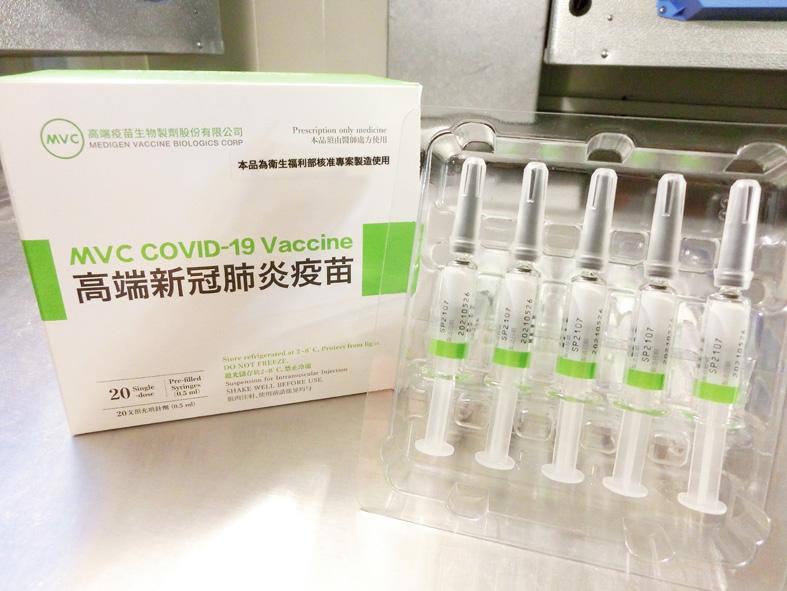Medigen Vaccine Biologics Corp (高端疫苗), the manufacturer of the only domestically-made COVID-19 vaccine that has received emergency use authorization in Taiwan, yesterday announced its out-licensing agreement with the COVID-19 Technology Access Pool (C-TAP) hosted by WHO and the UN-backed Medicine Patent Pool (MPP), which would make the vaccine technology available worldwide to people in need.
Through C-TAP initiative, Medigen will share its COVID-19 vaccine, technology and training in a license that is global, transparent and non-exclusive to manufacturers worldwide, the company said in a statement.

Photo courtesy of the Food and Drug Administration
Medigen CEO Charles Chen (陳燦堅) said the company aims to provide equitable access to its vaccine technology to ensure that no one is left behind in the battle against COVID-19.
"This is not just about COVID-19, it’s about setting up a precedent for future global health challenges. By demonstrating our commitment to open science and cooperative strategies, we hope to inspire other organizations to follow suit," Chen said.
This is the first time that a vaccine manufacturer will use C-TAP to offer its patent and know-how for a COVID-19 vaccine, the WHO said in a separate statement. Medigen's COVID-19 vaccine has been used in more than 3 million administrations across seven countries, it said.
In addition to Medigen, the WHO said that C-TAP has also entered into partnership with the Spanish National Research Council and the University of Chile to transfer know-how, materials and clinical data on COVID-19 technology.
C-TAP was launched in 2020 by the WHO director-general and the president of Costa Rica with the goal of facilitating timely and affordable access to COVID-19 health products, according to the WHO, which added that it is supported by 45 member states.
Based in Hsinchu County, Medigen is a biopharmaceutical company that uses cell-based technologies for the development of vaccines and biosimilars. It developed and manufactured the first SARS-CoV-2 vaccine in the country with emergency use approval granted in 2021.

A magnitude 7.0 earthquake struck off Yilan at 11:05pm yesterday, the Central Weather Administration (CWA) said. The epicenter was located at sea, about 32.3km east of Yilan County Hall, at a depth of 72.8km, CWA data showed There were no immediate reports of damage. The intensity of the quake, which gauges the actual effect of a seismic event, measured 4 in Yilan County area on Taiwan’s seven-tier intensity scale, the data showed. It measured 4 in other parts of eastern, northern and central Taiwan as well as Tainan, and 3 in Kaohsiung and Pingtung County, and 2 in Lienchiang and Penghu counties and 1

FOREIGN INTERFERENCE: Beijing would likely intensify public opinion warfare in next year’s local elections to prevent Lai from getting re-elected, the ‘Yomiuri Shimbun’ said Internal documents from a Chinese artificial intelligence (AI) company indicated that China has been using the technology to intervene in foreign elections, including propaganda targeting Taiwan’s local elections next year and presidential elections in 2028, a Japanese newspaper reported yesterday. The Institute of National Security of Vanderbilt University obtained nearly 400 pages of documents from GoLaxy, a company with ties to the Chinese government, and found evidence that it had apparently deployed sophisticated, AI-driven propaganda campaigns in Hong Kong and Taiwan to shape public opinion, the Yomiuri Shimbun reported. GoLaxy provides insights, situation analysis and public opinion-shaping technology by conducting network surveillance

‘POLITICAL GAME’: DPP lawmakers said the motion would not meet the legislative threshold needed, and accused the KMT and the TPP of trivializing the Constitution The Legislative Yuan yesterday approved a motion to initiate impeachment proceedings against President William Lai (賴清德), saying he had undermined Taiwan’s constitutional order and democracy. The motion was approved 61-50 by lawmakers from the main opposition Chinese Nationalist Party (KMT) and the smaller Taiwan People’s Party (TPP), who together hold a legislative majority. Under the motion, a roll call vote for impeachment would be held on May 19 next year, after various hearings are held and Lai is given the chance to defend himself. The move came after Lai on Monday last week did not promulgate an amendment passed by the legislature that

Taiwan is gearing up to celebrate the New Year at events across the country, headlined by the annual countdown and Taipei 101 fireworks display at midnight. Many of the events are to be livesteamed online. See below for lineups and links: Taipei Taipei’s New Year’s Party 2026 is to begin at 7pm and run until 1am, with the theme “Sailing to the Future.” South Korean girl group KARA is headlining the concert at Taipei City Hall Plaza, with additional performances by Amber An (安心亞), Nick Chou (周湯豪), hip-hop trio Nine One One (玖壹壹), Bii (畢書盡), girl group Genblue (幻藍小熊) and more. The festivities are to